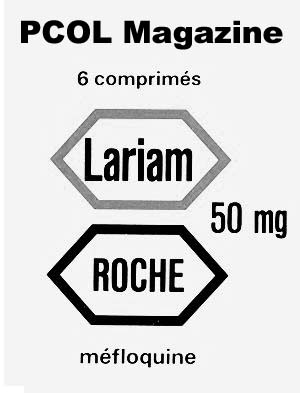
Defense analyzes soldier’s suicide and possible link to Lariam
Defense analyzes soldier’s suicide
By PAM ZUBECK - THE GAZETTE
Defense Department researchers have requested blood samples from the body of a Special Forces soldier who killed himself at his Monument home Sunday after returning from a 10-month tour in Iraq.
The Armed Forces Institute of Pathology will screen for a variety of substances, including narcotics and a controversial
drug used to protect troops against malaria.
The tests will become part of the military’s ongoing analysis of active-duty deaths.
“We’re trying to keep an eye on all our soldiers, airmen, sailors around the world,” institute spokesman Chris Kelly said. “We work very hard to track them, especially if they’re individuals returned to the United States, to see if there are any trends that develop.”
The malaria drug mefloquine, whose product name is Lariam, is being tracked because “it’s become an area of concern,” Kelly said.
He said, however, that of the 31 Army suicides since the war in Iraq started — 24 of them in Iraq and seven that happened back home — only one has had a positive Lariam test.
Tests on three troops are pending, including that of Chief Warrant Officer William Howell, 36, who shot himself in the head outside his home during a confrontation with police.
Howell’s death, which came three weeks after his return from serving in Iraq with a unit that saw heavy combat, has compounded nagging questions about whether Lariam plays a role in soldiers’ mental problems and suicides.
Howell took Lariam, said Maj. Robert Gowan, spokesman for the Army’s Special Forces. An autopsy showed Howell had a blood-alcohol level above the .10 legal limit for driving.
Lariam can cause psychiatric symptoms, including anxiety, paranoia, depression, hallucinations and psychotic behavior, according to warnings from its manufacturer, Roche Pharmaceuticals.
A notice from Roche also cautions against prescribing Lariam for those with depression, a recent history of depression, anxiety disorder or other major psychiatric problems. It also warns symptoms “on occasion” can arise “long after” a person stops taking the drug.
Lariam, normally given in weekly doses, was approved by the Federal Drug Administration in the late 1980s. About 20 million people have taken it, including tourists and Peace Corps volunteers.
The military reports about 45,000 Lariam pills were prescribed to soldiers from October 2002 to September 2003.
Despite endorsement from the Centers for Disease Control and Prevention, new concern about Lariam’s use during Operation Iraqi Freedom has led the Pentagon to reassess its benefits and risks, including the possibility of significant neuropsychological episodes.
The Army is to unveil results next week of a Mental Health Advisory Team’s study undertaken last year that looked at Lariam and other issues. Senior officials are being briefed this week, defense spokesman James Turner said.
Defense officials say there is no cause for alarm.
“It’s a function of what is an FDA-approved drug, and the department uses the FDA rules,” Turner said. “All FDAapproved materials are available (to the military), and they are the finest in the world.”
Turner said the potential dangers of Lariam don’t apply to everyone.
“To generalize about every single person is a mistake,” he said. “We look at each person, and the prescriptions or medical procedures are administered in accordance with best medical practices.”
That might be the goal, but it doesn’t always play out that way in the field, some say.
Staff Sgt. Georg-Andreas Pogany, a Fort Carson soldier charged with cowardice after suffering a severe anxiety attack in Iraq, has said a medic, not a doctor, handed out boxes of Lariam to soldiers.
The box included a list of possible side effects, but Pogany said he didn’t read it. Even if he had, he said he would have taken it because refusing would be disobeying an order.
Pogany said he took the drug four times, including Sept. 29, when he saw the body of an Iraqi man killed by U.S. forces and felt he was headed for a nervous breakdown. The cowardice allegation has been replaced with willful dereliction, and the case is pending.
Testimonials questioning Lariam’s effects also can be found on the Internet.
Questions about how soldiers, airmen and sailors are evaluated for depression and mental health problems were referred to Army personnel officials, who did not return a phone call seeking comment.
Another warning issued by Roche Pharmaceuticals says “caution should be exercised with regard to activities requiring alertness and fine motor coordination such as driving, piloting aircraft and operating machinery, as dizziness, a loss of balance, or other disorders of the central or peripheral nervous system have been reported during and following the use of Lariam.”
A U.S. Central Command spokesman said he knew of no accidents in Iraq that have involved soldiers who were taking Lariam. Many investigations are pending, however, including one this week in which a passing vehicle struck a tank and caused a weapon to hit a Fort Carson soldier, who was killed in the mishap.
Betty Ann Mauger, a spokeswoman with the Air Force Surgeon General’s office, said airmen serving in Iraq took 6,650 doses of Lariam during 2003.
She couldn’t rule out the possibility pilots have taken the drug.
“If they are sent to areas that are possibly malarial, yes,” pilots could have been prescribed the drug, she said, but she added that pilots’ physicians look at risks versus benefits before prescribing any medication, including Lariam.
Copyright 2004, The Gazette, a division of Freedom Colorado Information. All rights reserved.
